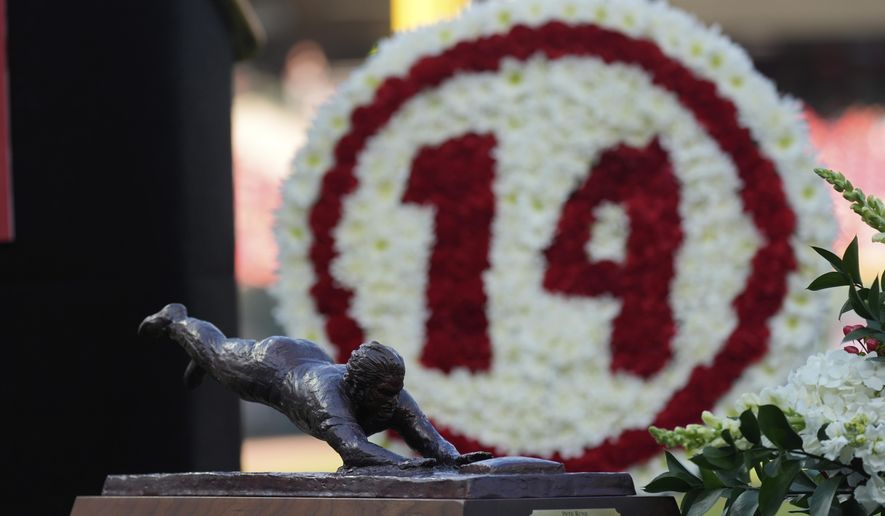OPINION:
The banishment from baseball of Pete Rose was supposed to be about more than just the shortcomings and personal failings — and there were many — of the late Cincinnati Reds great.
Rose, after all, is one of the icons — tarnished, but an icon — of the game. The all-time hits leader, whose hard-nosed style of play made him a favorite among fans, some of whom turned him into a rebel folk hero after then-Commissioner Bart Giamatti announced his ban from baseball in 1989.
President Jimmy Carter made Rose’s reinstatement his personal cause. Debates about his prohibition from the Hall of Fame were a sports talk show standard. I’m surprised Bob Dylan didn’t write a song about Rose.
Maybe now that he’s dead, Dylan will.
Then on Tuesday, Commissioner Rob Manfred penned his own ode to Rose. He removed Rose — and other deceased players, including the legendary Black Sox scandal figure Shoeless Joe Jackson — from baseball’s permanently ineligible list.
It was Rose’s death in September at the age of 83 that supposedly moved Manfred to free the Hit King — or at least his legacy.
“Obviously, a person no longer with us cannot represent a threat to the integrity of the game,” Manfred wrote in a letter to attorney Jeffrey M. Lenkov, who petitioned for Rose’s removal from the list in January. “Moreover, it is hard to conceive of a penalty that has more deterrent effect than one that lasts a lifetime with no reprieve.
“Therefore, I have concluded that permanent ineligibility ends upon the passing of the disciplined individual, and Mr. Rose will be removed from the permanently ineligible list.”
On the surface, this reasoning is almost juvenile. Did Manfred really think that Rose posed some sort of threat to baseball while he was alive? What did he think, then, of Rose’s tenure as an analyst for Fox Sports’ baseball coverage while being banished from the game? Based on this reasoning, Manfred should have gone to Fox and demanded Rose’s removal from the studio to protect the integrity of the game.
No, the banishment of such an important figure in baseball history as Rose — a 17-time All-Star who holds multiple records, including the revered 4,256 career hits mark — wasn’t about the threat one very flawed individual posed to baseball
It was about sending a message to the baseball industry that would reverberate over generations: If they can ban a celebrated figure like Rose, what could they do to me?
The value of that message didn’t disappear with Rose’s death. If anything, given the legalization of sports betting and the commercial partnerships between baseball and the gambling industry — including sports books inside stadiums — the banning of a legend like Rose and his absence from the Hall of Fame is a message that is more important than ever. The risks for damage to the integrity of baseball are higher now than since the 1919 Black Sox World Series betting scandal that nearly brought the game down.
So why now? Why did Manfred feel that suddenly the game was safe when it is actually the most vulnerable it has been in more than 100 years? Why free the corpse of Pete Rose?
Because President Trump said so. Simple as that.
Manfred met with the president in April to discuss a number of topics — baseball is looking at some broadcast issues involving the future of direct-to-consumer streaming — and the conversation included Rose. “I met with President Trump two weeks ago,” Manfred told reporters. “One of the topics was Pete Rose, but I’m not going beyond that,” Manfred said at the time. “He’s said what he said publicly. I’m not going beyond that in terms of what the back and forth was.”
The president has spoken out several times over the years in favor of Rose’s reinstatement. Earlier this year, he said on social media he would “be signing a complete PARDON of Pete Rose, who shouldn’t have been gambling on baseball, but only bet on HIS TEAM WINNING.”
When I asked John Dowd, the former Justice Department attorney who conducted the Rose investigation for baseball, if he believed Mr. Trump was connected to baseball’s decision to lift the ban, he answered, “Yes.”
]“It is very sad to lose the integrity in the leaders assigned to protect the game especially when they witnessed first-hand Pete’s corruption of the game,” said Dowd, who once served as a legal adviser to the president. “Serving three commissioners, I learned this precious game exists in the bone marrow of the American people. Without integrity in the protection of the game, there is no game.”
This is the path now for Rose to wind up in Cooperstown. He will not be voted on by the baseball writers. Instead, his candidacy will be put in front of the Hall of Fame’s Historical Overview Committee for review and then the Era Committee, made up of media members, Hall of Famers and baseball executives.
They will have to hold their noses to let Rose in.
He was a great player and a bad guy. He was accused of having a sexual relationship with an underage girl. Rose denied the charges. His defense? Claiming she was 16 at the time, which in Ohio was the age of consent. Rose was in his mid-30s and married with two children. He did business with mobsters and drug addicts, according to documents obtained by ESPN. He didn’t travel the country trying to spread the word about the dangers that destroyed his baseball legacy. He spent his time denying it, or, when he no longer could lie about it, profiting from it with a book and public appearances, while sabotaging efforts behind the scenes to reinstate him.
Now he is dead, and Manfred is no longer afraid of Rose. He has other fears.
• Catch Thom Loverro on “The Kevin Sheehan Show” podcast.




Please read our comment policy before commenting.